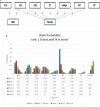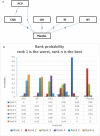The Comparative Efficacy of Multiple Interventions for Mild Cognitive Impairment in Alzheimer's Disease: A Bayesian Network Meta-Analysis
- PMID: 32581760
- PMCID: PMC7289916
- DOI: 10.3389/fnagi.2020.00121
The Comparative Efficacy of Multiple Interventions for Mild Cognitive Impairment in Alzheimer's Disease: A Bayesian Network Meta-Analysis
Abstract
Background: Mild cognitive impairment (MCI) is the early phase of Alzheimer's disease (AD). The aim of early intervention for MCI is to decrease the rate of conversion from MCI to AD. However, the efficacy of multiple interventions in MCI, and the optimal methods of delivery, remain controversial. We aimed to compare and rank the treatment methods for MCI in AD, in order to find an optimal intervention for MCI and a way to prevent or delay the occurrence of AD. Methods: Pair-wise and network meta-analysis were conducted to integrate the treatment effectiveness through direct and indirect evidence. Four English databases and three Chinese databases were searched for international registers of eligible published, single or double blind, randomized controlled trials up to September 31st 2019. We included nine comparative interventions: pharmacological therapies which incorporated cholinesterase inhibitors (ChEI), ginkgo, nimodipine, and Chinese medicine; non-pharmacological therapies comprising of acupuncture, music therapy, exercise therapy, and nutrition therapy; and a placebo group. The primary outcome was the Mini-Mental State Examination (MMSE) score. The secondary outcome was the AD Assessment Scale-cognitive subscale (ADAS-cog). Results: Twenty-eight trials were eligible, including 6,863 participants. In the direct meta-analysis, as for the Mini-Mental State Examination scale, the ChEIs (MD: -0.38; 95% CI: -0.74, -0.01), Chinese medicine (MD: -0.31; 95% CI: -0.75, 0.13), exercise therapy (MD: -0.50; 95% CI: -0.65, -0.35), music therapy (MD: -1.71; 95% CI: -4.49, 1.07), were statistically more efficient than placebo. For AD Assessment Scalecognitive subscale outcome, ChEIs (MD: 1.20; 95% CI: 0.73, 1.68), Acupuncture (MD: 1.36; 95% CI: 1.28, 1.44), Chinese medicine (MD: 0.61; 95% CI: 0.49, 0.73) and exercise (MD: 0.61; 95% CI: 0.49, 0.73) were better than placebo. In the network meta-analysis, the MMSE outcome ranked music therapy (59%) as the best and Acupuncture (26%) as second. Nutrition and Ginkgo treatment had the lowest rank among all interventions. For ADAS-cog outcome, acupuncture (52) ranked the best. Conclusion: Among the nine treatments studied, music therapy appears to be the best treatment for MCI, followed by acupuncture. Our study provides new insights into potential clinical treatments for MCI due to AD, and may aid the development of guidelines for MCI in AD.
Keywords: Alzheimer's disease; acupuncture; mild cognitive impairment; multiple interventions; music therapy; network meta-analysis.
Copyright © 2020 Lai, Wen, Li, Lu and Tang.
Figures




Similar articles
-
Efficacy and safety of acupuncture for cognitive impairment in Alzheimer's disease: a systematic review and meta-analysis.Front Dement. 2024 Jul 3;3:1380221. doi: 10.3389/frdem.2024.1380221. eCollection 2024. Front Dement. 2024. PMID: 39081600 Free PMC article.
-
Acupuncture and Related Therapies for the Cognitive Function of Alzheimer's Disease: A Network Meta-Analysis.Iran J Public Health. 2021 Dec;50(12):2411-2426. doi: 10.18502/ijph.v50i12.7924. Iran J Public Health. 2021. PMID: 36317033 Free PMC article. Review.
-
Efficacy and safety of hypoglycemic drugs in improving cognitive function in patients with Alzheimer's disease and mild cognitive impairment: A systematic review and network meta-analysis.Front Neurol. 2022 Nov 30;13:1018027. doi: 10.3389/fneur.2022.1018027. eCollection 2022. Front Neurol. 2022. PMID: 36530613 Free PMC article.
-
Alzheimer's Disease Assessment Scale-Cognitive subscale variants in mild cognitive impairment and mild Alzheimer's disease: change over time and the effect of enrichment strategies.Alzheimers Res Ther. 2016 Feb 12;8:8. doi: 10.1186/s13195-016-0170-5. Alzheimers Res Ther. 2016. PMID: 26868820 Free PMC article.
-
Psychosocial interventions for Alzheimer's disease cognitive symptoms: a Bayesian network meta-analysis.BMC Geriatr. 2018 Aug 7;18(1):175. doi: 10.1186/s12877-018-0864-6. BMC Geriatr. 2018. PMID: 30086714 Free PMC article.
Cited by
-
Acupuncture on mild cognitive impairment: A systematic review of neuroimaging studies.Front Aging Neurosci. 2023 Feb 15;15:1007436. doi: 10.3389/fnagi.2023.1007436. eCollection 2023. Front Aging Neurosci. 2023. PMID: 36875696 Free PMC article.
-
A Study on the Effect of Traditional Chinese Exercise Combined With Rhythm Training on the Intervention of Older Adults With Mild Cognitive Impairment.Am J Alzheimers Dis Other Demen. 2023 Jan-Dec;38:15333175231190626. doi: 10.1177/15333175231190626. Am J Alzheimers Dis Other Demen. 2023. PMID: 37489602 Free PMC article. Clinical Trial.
-
The effects of mind-body exercise on anxiety and depression in older adults: a systematic review and network meta-analysis.Front Psychiatry. 2024 Feb 7;15:1305295. doi: 10.3389/fpsyt.2024.1305295. eCollection 2024. Front Psychiatry. 2024. PMID: 38384592 Free PMC article.
-
Frailty, cognitive impairment, and depressive symptoms in Chinese older adults: an eight-year multi-trajectory analysis.BMC Geriatr. 2023 Dec 12;23(1):843. doi: 10.1186/s12877-023-04554-1. BMC Geriatr. 2023. PMID: 38087208 Free PMC article.
-
Dietary Habits Modify the Association of Physical Exercise with Cognitive Impairment in Community-Dwelling Older Adults.J Clin Med. 2022 Aug 30;11(17):5122. doi: 10.3390/jcm11175122. J Clin Med. 2022. PMID: 36079052 Free PMC article.
References
-
- Andreas S., Dietlinde K. S., Florian S., Nina F., Theresa S., Rainer H., et al. . (2015). Exercise Treatment of Alzheimer's disease and mild cognitive impairment: a systematic review and meta-analysis of effects on cognition in randomized controlled trials. Am. J. Geriatric Psychiatry 23, 1234–1249. 10.1016/j.jagp.2015.07.007 - DOI - PubMed
-
- Cai Y. J., Xu H. L., Cao J. Q., Cao Y. F., Yuan S. (2019). Effect analysis of neuromuscular therapy in young people with amnestic mild cognitive impairment. Sci. Technol. Wind 232–236. 10.19392/j.cnki.16717341.201922202 - DOI
Publication types
LinkOut - more resources
Full Text Sources

